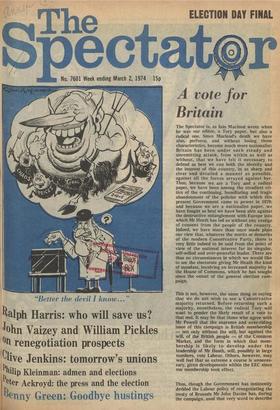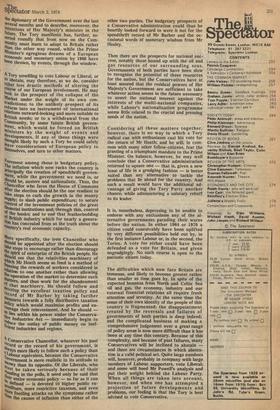A vote for Britain
The Spectator is, as lain Macleod wrote when he was our editor, a Tory paper, but also a radical one. Since Macleod's death we have also, perforce, and without losing those characteristics, become much more nationalist: Britain has been under such steady and unremitting attack, from within as well as without, that we have felt it necessary to defend as best we can both the identity and the interest of this country, in as sharp and clear and detailed a manner as possible, against all the forces arrayed against her. Thus, because we are a Tory and a radical paper, we have been among the steadiest critics of the continuing, humiliating and tragic abandonment of the policies with which this present Government came to power in 1970; and because we are a nationalist paper, we have fought as best we have been able against the destructive entanglement with Europe into which Mr Heath has led us without any vestige of consent from the people of the country. Indeed, we have more than once made plain our view that, whatever the merits or demerits of the modern Conservative Party, there is very little indeed to be said from the point of view of the national interest for its singular, self-willed and over-powerful leader. There are thus no circumstances in which we would like to see the electorate giving Mr Heath the kind of mandate, involving an increased majority in the House of Commons, which he has sought since the outset of the general election campaign.
This is not, however, the same thing as saying that we do not wish to see a Conservative majority returned. Before returning such a majority, nonetheless, the radical Tory will want to ponder the likely result of a vote to that end. It may be that those who agree with Mr Powell that the supreme and over-riding issue of this campaign is British membership — not only without the will, but against the will, of the British people — of the Common Market, and the form in which that membership is likely to develop under the leadership of Mr Heath, will, possibly in large numbers, vote Labour. Others, however, may well feel that so extreme a course is unnecessary, given developments within the EEC since our membership took effect.
Thus, though the Government has insistently derided the Labour policy of renegotiating the treaty of Brussels Mr John Davies has, during the campaign, used that very word to describe the diplomacy of the Government over the last several months and to describe, moreover, the intentions of Her Majesty's minister in the future. The Tory manifesto has, further, asserted roundly that from now on the ComMunity must learn to adapt to Britain rather than the other way round, while the Prime Nfinister's egregious dreams of a European economic and monetary union by 1980 have been thrown, by events, through the window.
A Tory unwilling to vote Labour or Liberal, or to abstain, may therefore, as we do, consider Other less drastic methods of altering the course of our European involvement. He may look to the prospect of the collapse of the Market under the weight of its own contradictions; to the unlikely prospect of its reform into an instrument of international relations outward-looking and more suitable to Rritish needs; or to a withdrawal from the Coinmunity, by some future British governtilent, which would be forced on British Ministers by the weight of events and developments. If any of these things were thought likely by such a Tory he could safely Leave considerations of European policy to memselves, and turn to other matters.
Foremost among these is budgetary policy. The inflation which now racks the country is Principally the creation of spendthrift governinent, while the government we need is, or Should be, austere and nationalistic. Thus, the Chancellor who faces the House of Commons after the election should be the one readiest to take steps to curb the growth in the money !uPPIY; to slash public expenditure; to secure rotrol of the investment policies of the great ancial institutions and, through this, control Of the banks; and to end that featherbedding British industry which for nearly a generation has concealed from us the truth about the Qtaintry's real economic capacity.
„T v, Ore specifically, the iron Chancellor who 4nould be appointed after the election should ttaLlie steps to encourage rather than discourage ,IILe spirit of enterprise of the British people. He 'nould see that the relativities machinery of ilach Mr Heath seems so fond is a method of eezing the rewards of workers considered in ttelation to one another rather than allowing he operation of the market to determine such Matters, and thus work for the abandonment f that machinery. He should follow and ',.evelop the excellent taxation policy and 'eeord of Mr Barber by taking further theasures towards a fully distributive taxation tkilicY which would maximise profits and enMirage their reinvestment. And he should lies within his power under the Conservarive Industries Act — immediately begin to feiuce the outlay of public money on inefiMent industries and regions.
Conservative Chancellor, whatever his past a'eleord or the record of his government, is always more likely to follow such a policy than (L,ILabour equivalent, because the Conservative Zvernment is more realistic in its attitude to 'IleY than its opposite. Of the Liberals, who kthOst be taken seriously because of their 41411,ding in the polls, it need only be said that bee'r entire economic policy — so far as it can t,„ defined — is devoted to higher public ex7hditure, more restrictive taxation, and even tore footling attacks on the symptoms rather lian the causes of inflation than either of the other two parties. The budgetary prospects of a Conservative administration could thus be heartily looked forward to were it not for the spendthrift record of Mr Barber and the occasional words of monetary wisdom from Mr Healey.
Then there are the prospects for national success, notably those bound up with the oil and gas resources of our surrounding seas. Governments of both parties have been slow to recognise the potential of these resources for the nation, but the Conservatives have at least assured that the residual powers of Her Majesty's Government are sufficient to take whatever action seems in the future necessary to assert the national interest against the interests of the multi-national companies, while Labour's nationalisation programme seems little related to the crucial and pressing needs of the nation.
Considering all these matters together, however, there is no way in which a Tory radical can with enthusiasm cast his vote for the return of Mr Heath; and he will, in common with many other fellow-citizens, fear the granting of a triumphant mandate to the Prime Minister. On balance, however, he may well conclude that a Conservative administration returned to square one — that is, given a new lease of life in a grudging fashion — is better suited than any alternative to tackle the problems that lie ahead for the country. And such a result would have the additional advantage of giving the Tory Party another chance, while administering a salutary rebuff to its leader.
It is, nonetheless, depressing to be unable to endorse with any enthusiasm any of the alternative governments parading their wares before the nation. In either 1964 or 1970 a citizen could conceivably have been uplifted by very different possibilities held out by, in the first instance Labour or, in the second, the Tories. A vote for either could have been defended as a vote for Britain, and given ungrudgingly. No such course is open to the patriotic citizen today.
The difficulties which now face Britain are immense, and likely to become greater rather than smaller as time goes by. In spite of the expected bonanza from North and Celtic Sea oil and gas, the economy, industry and our external financial relations all require fresh attention and scrutiny. At the same time the sense of their own identity of the people of this country is fragmented: the disappointment created by the reversals and failures of governments of both parties is deep indeed; and the complicated business of making a 'comprehensive judgement over a great range of policy areas is now more difficult than it has been at any time this century. Because of this 'complexity, and because of past failures, many 'Conservatives will be inclined to abstain — and there are circumstances in which abstention is a valid political act. Quite large numbers will, however, probably in company with large numbers of Labour supporters, vote Liberal; and some will heed Mr Powell's analysis and put their weight behind the Labour Party. When all things are taken into account, however, and when one has attempted a projection of future developments and problems, our feeling is that the Tory is best advised to vote Conservative.

































